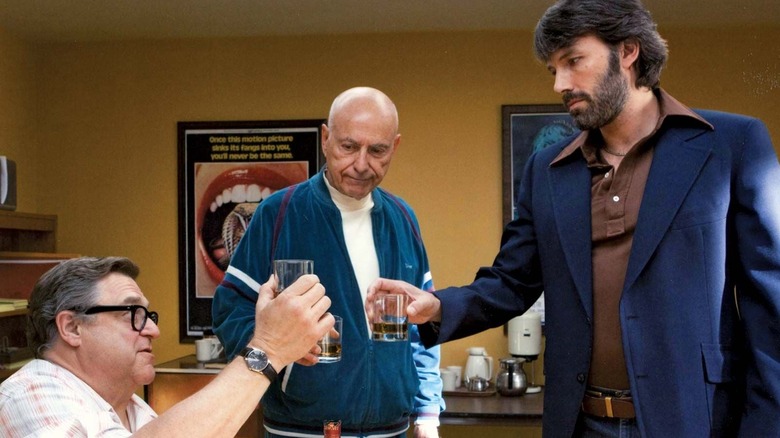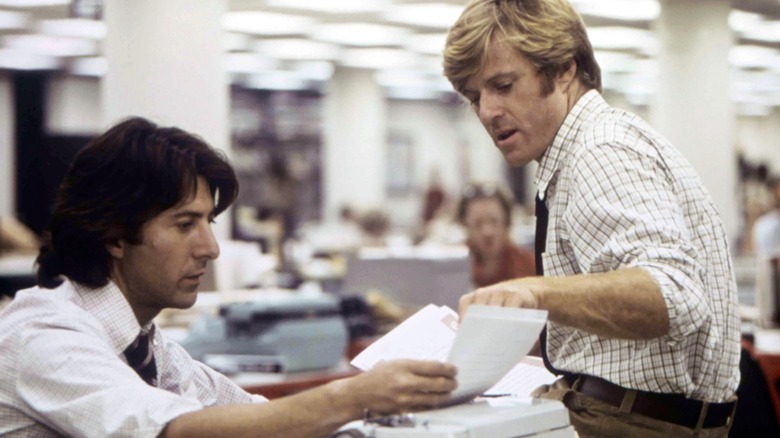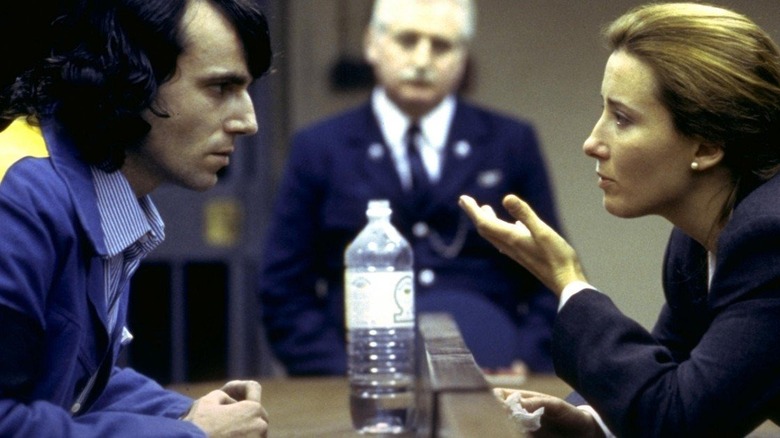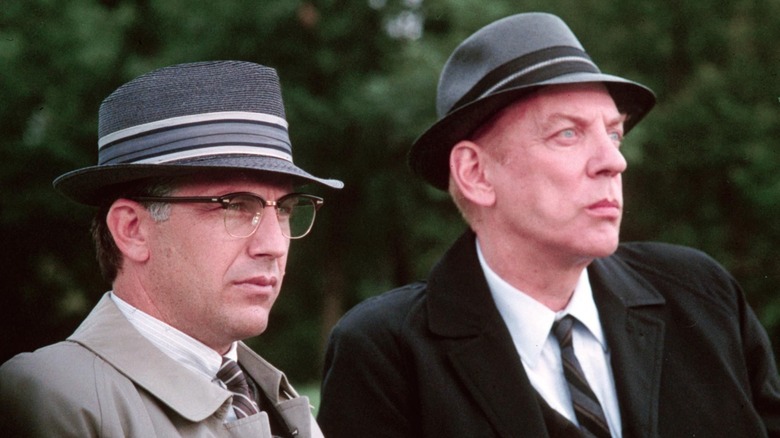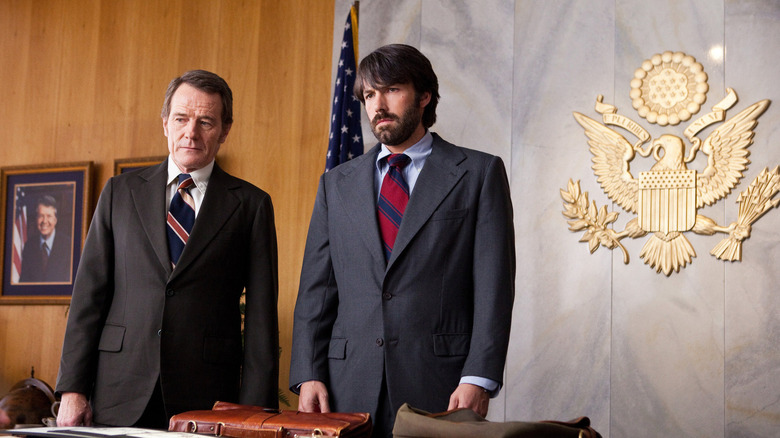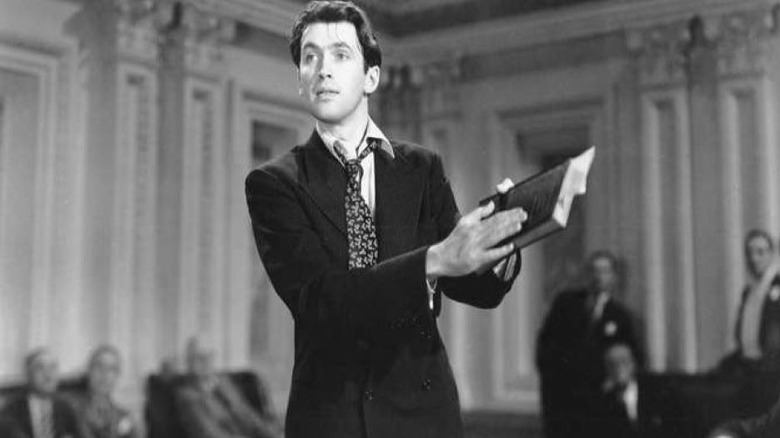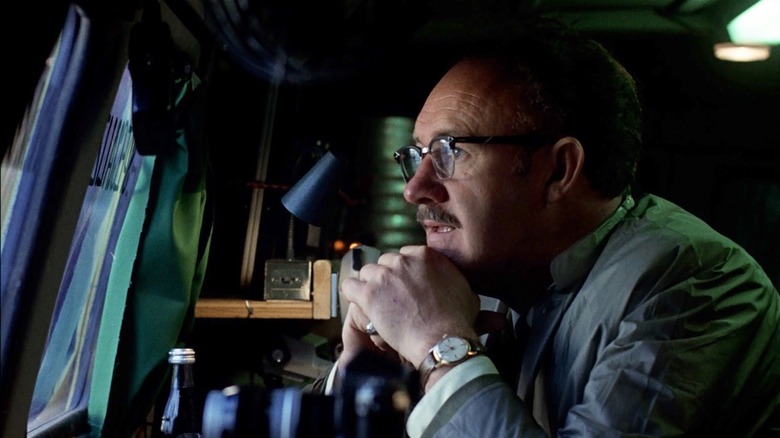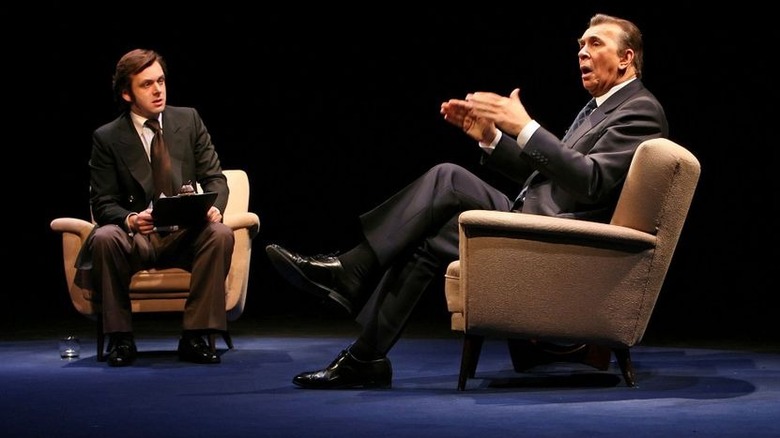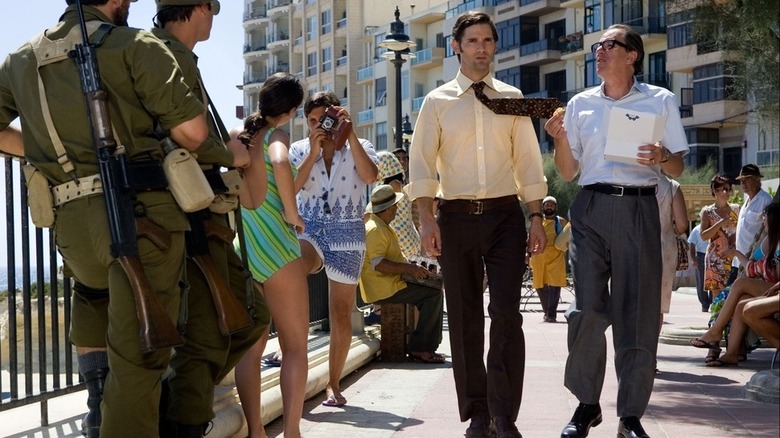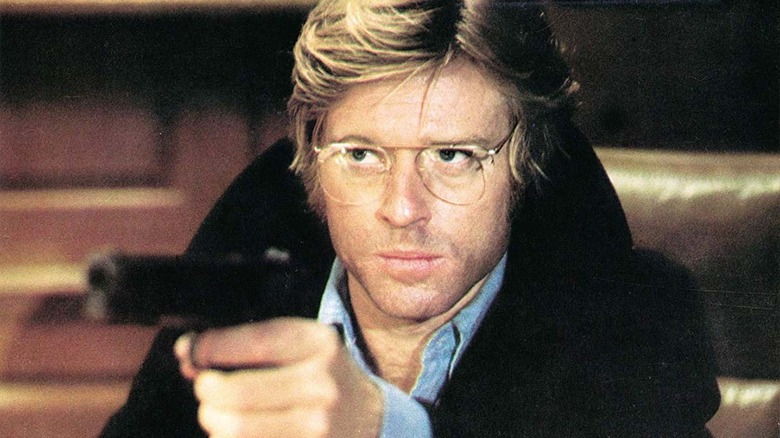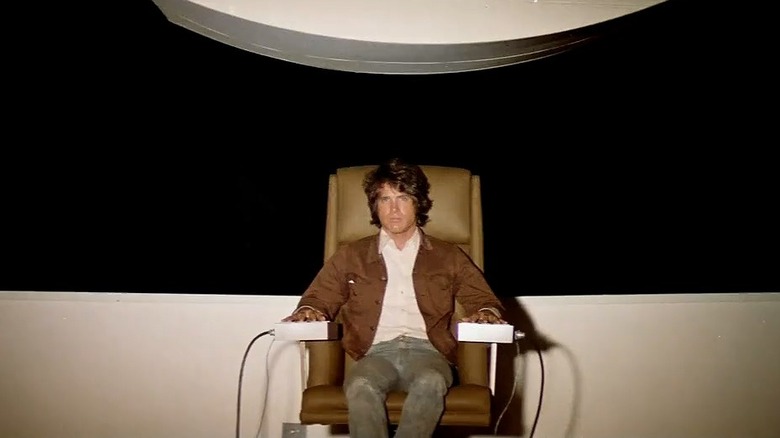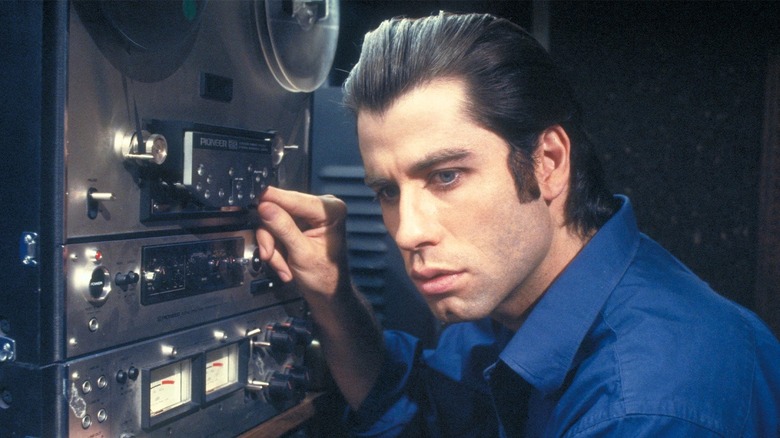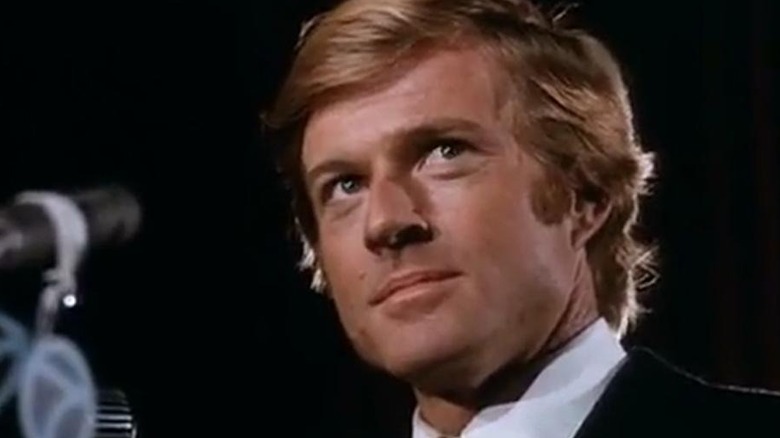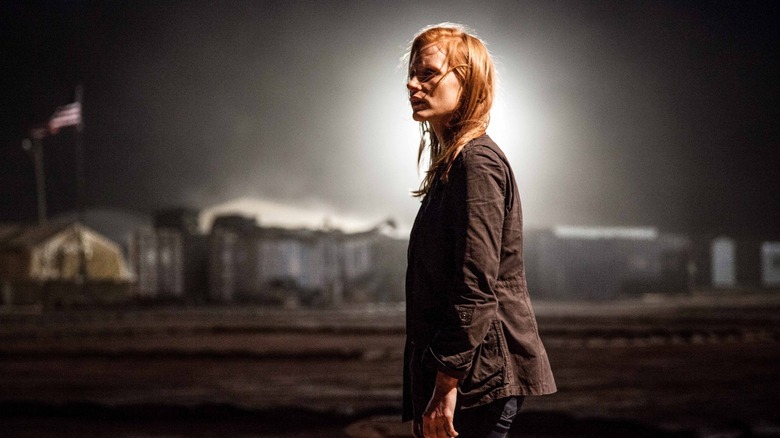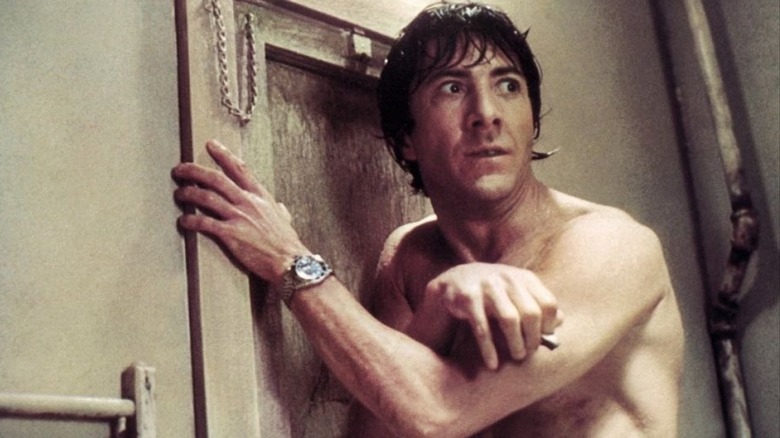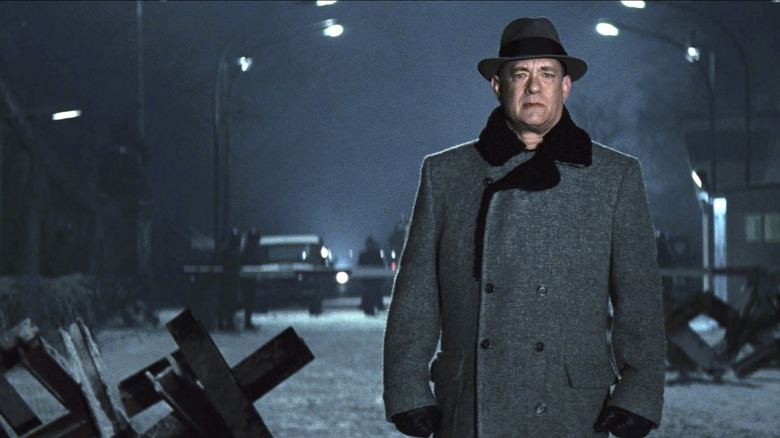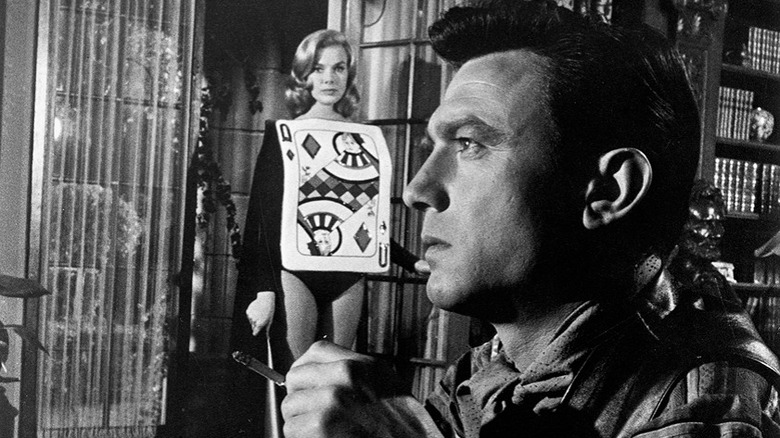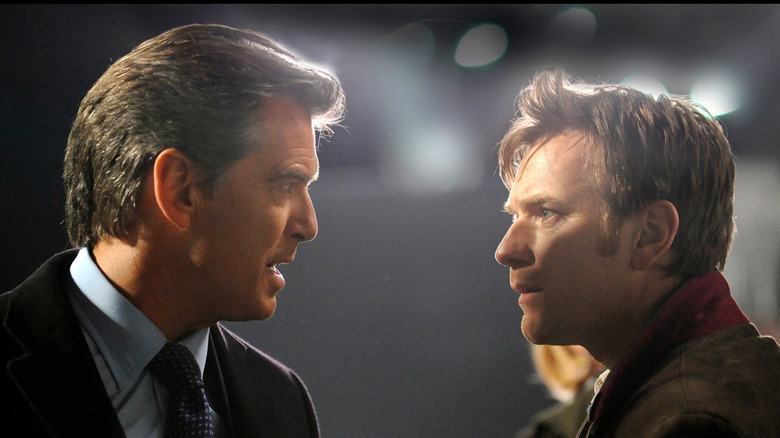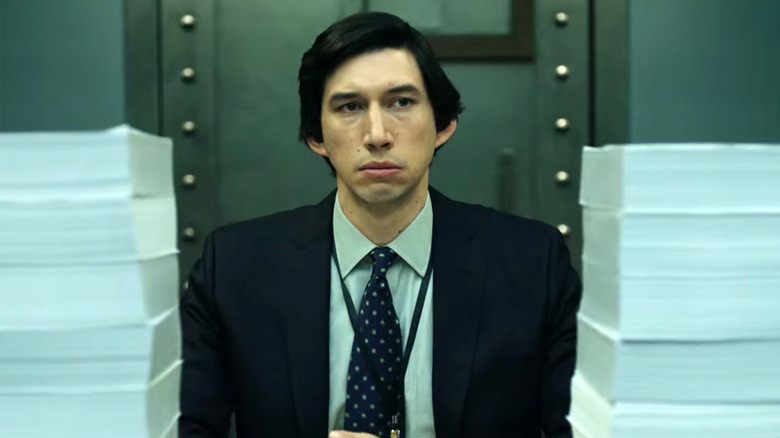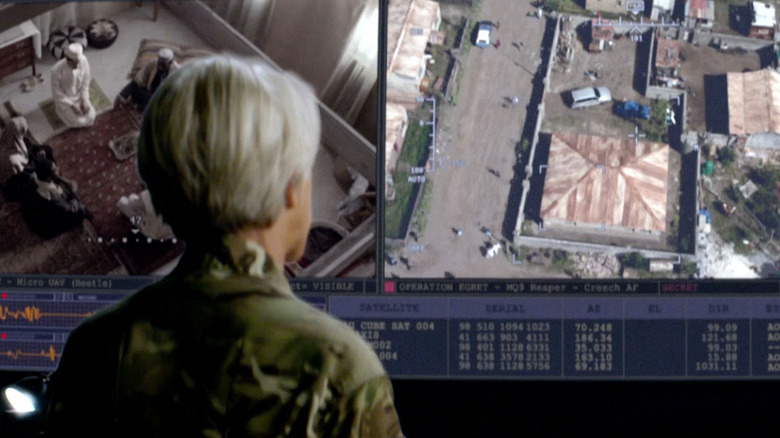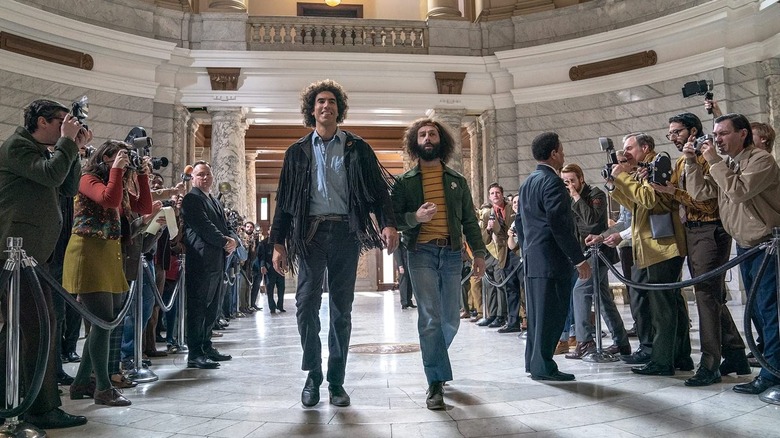The 20 Best Political Thriller Movies Ever Made
Contrary to a popular argument that's made its way into various corners of the Internet, films have always been political. From the earliest days of the art form, films both directly and indirectly tackling historical political issues and hot-button controversies have been released, and throughout the development of the form, films of each generation have responded to the ever-changing state of the world.
Indeed, every film ever made is a product of the era in which it was created; watch an older film, you'll have a window into a time when at least something was radically different. Part of the reason older films are reassessed is to learn and understand how things have changed politically — and not only why that's the case, but whether or not it was for the better.
However, films that directly attack politics are more overt in their influence, and politics are often more palatable when filtered through the lens of entertainment. If you've ever found yourself stressed out about a political issue, a great political thriller can be just as intense.
Here are the 20 greatest political thriller movies in cinema history.
All the President's Men
Political thrillers reached a new level of public attention throughout the 1970s thanks to the aftermath of the Watergate scandal, which caused a massive media circus that eventually resulted in U.S. President Richard Nixon's resignation from office. The anxiety and paranoia about Watergate and its aftermath was palpable, and it's a fear that filmmakers preyed upon throughout the next decade with films that suggested themes of surveillance, conspiracy, secret deals, rigged elections, and other shady covert operations.
The '70s "paranoid thriller" is a genre filmmakers continue to be influenced by; it even made its way into the Marvel Cinematic Universe, as writer/directors Anthony and Joe Russo stated that the genre was a notable influence during the creation of "Captain America: The Winter Soldier."
However, 1974's "All The President's Men" deals with Watergate head-on, as it explores the investigation by Washington Post journalists Bob Woodward (Robert Redford) and Carl Berenstein (Dustin Hoffman) into President Nixon's tapes, reporting which resulted in the public's knowledge of the Watergate conspiracy. Director Alan J. Pakula formed a foundational role in creating the '70s political thriller genre, and "All The President's Men" is a great example of his notorious attention to detail.
In The Name Of The Father
While the '70s political thriller genre is often associated directly with American politics as a result of the Watergate influence, the broader spectrum of political thrillers covers a more international perspective. It's a great tool to help learn about the political state of other governments and locations, especially when it's covering a pivotal moment from history.
The 1993 courtroom thriller "In The Name Of the Father" recreates one of the most controversial court cases in the history of the United Kingdom, and offers insight into the tensions of the IRA, which have been featured in many other political thrillers. As the film shows, the four men who were falsely convicted of the Guildford pub bombings in 1974 became known as the "Guildford Four," and director Jim Sheridan portrays the events in gripping detail, digging deep into what made the case so infuriating and shedding light on tensions that still exist in the U.K. today.
However, it's also a very emotional film that has empathy for these men and the suffering they experienced in prison. Daniel Day-Lewis delivers one of his strongest performances as Gerard Patrick Conlon, who was imprisoned alongside his father, Patrick (Pete Postlethwaite).
JFK
There are few events in the history of American politics that are quite as controversial, divisive, and prone to conspiracy theories as the 1963 assassination of U.S. President John F. Kennedy. The events in Dallas have been poured over by historians, analysts, investigations, and fiction writers since they occurred, and the lack of solid answers has only furthered the development of beliefs that a grand conspiracy was at play. Some remain incredibly rigid in their opinion, and the Internet rabbit hole of the phrase "JFK assassination" is unbelievably vast.
Of course, any hot button issue in American politics was bound to be covered by director Oliver Stone, who is renowned for his political beliefs and incorporating them into his work. Stone's films are often inflammatory as they pertain to his viewpoints, and he frequently tackles narratives about hidden secrets from the government and the need to question authority. Stone's 1991 film "JFK" follows the New Orleans-based lawyer Jim Garrison (Kevin Costner) as he pries into the Kennedy assassination case and attempts to make a more nuanced investigation.
Argo
For those who like to complain that modern movies are too political, the 2012 political thriller "Argo" recounts an incredible incident in which the motion picture industry came in to solve an actual political crisis that threatened lives.
The film tells a true story of an operation by CIA agent Tony Mendez (Ben Affleck) to rescue Americans who were trapped in Iran after a rebel insurgency took hold of the U.S. Embassy amidst the Iranian Revolution. The rebels hunt down the Americans, but given the fragile state of U.S. relations (particularly with an election cycle), the U.S. government is cagey about sending an official operation that could be misinterpreted or provoke larger conflict in the region.
Mendez devised an incredible plan — he would travel with undercover agents to Iran under the guise that they were the crew for a science fiction film titled "Argo," in the aftermath of the box office success of 70s sci-fi films like "Star Wars," "Star Trek: The Motion Picture," "Moonraker," and "The Black Hole." The hostages could then be transported out of the country under the same premise. The film is based on Mendez's biography, and contains his insights on the state of both Middle East relations and the 1970s film industry. Affleck also directed the film, his third feature after the gripping mystery "Gone Baby Gone" and the thrilling heist film "The Town."
Mr. Smith Goes To Washington
For anyone that needs further convincing that Hollywood has always been attacking political issues and controversies, then look no further than the Golden Age of Hollywood, which released some of the greatest political thrillers in history, and some that were foundational to the genre. Director Frank Capra and the most likable movie star of all time, James Stewart, are best known for their uplifting Christmas classic "It's A Wonderful Life," but an early collaboration between the two created one of the most gripping and devastating political thrillers ever.
1939's "Mr. Smith Goes To Washington" saw Capra criticizing the corruption of the Senate and looking at the systemic flaws within the legislative branch of the U.S. Government. Capra subverted what initially seems like an uplifting outsider story into an infuriating thriller about a well-intentioned citizen being taken advantage of. Jimmy Stewart stars as the titular Mr. Smith, an affectionate, intelligent, small-town Boy Scout troop leader beloved by his community. Smith is asked to step in as the representative of his state in the senate. His first order of business is making a seemingly honest proposal to hold a national convention for Boy Scouts that would gather members from all across the country and unite them.
However, Smith does not realize that the land he's planning to hold the conference on is being profited off of by corrupt politicians. He's framed in a particularly cruel conspiracy.
The Conversation
Of all the great filmmakers of the '70s that responded to the ongoing sense of paranoia in political thrillers, Francis Ford Coppola's run of success is nearly unparalleled. Coppola directed many of the films that are considered among the best ever made in only a short period of time, and each took an angle that was either directly or indirectly tied to the political thriller genre. In 1974, Coppola had the unique achievement of directing two of the greatest films within a one-year period thanks to his work on "The Godfather: Part II" and the fundamental political thriller "The Conversation."
"The Conversation" was among the first films to tackle the sense of the surveillance state, and few films since have been able to tackle the paranoia of being watched in a manner quite as effectively. The film follows the surveillance expert Harry Caul (Gene Hackman), who accidentally discovers evidence of a murder while surveilling passersby in a public park. Caul questions whether or not he should speak out and turn the evidence over to investigators, as he could risk exposing the secret nature of his profession.
Frost/Nixon
Although the residual impacts of the Watergate scandal fed into the emergence of many '70s film classics, modern political thrillers have continued to look back at this era as a source of influence. Nixon himself has been a prominent figure in many films ranging from both biographical portrayals (such as Oliver Stone's "Nixon") to fictional depictions in genre films (Nixon is a character in superhero films like "Watchmen" and "X-Men: Days of Future Past"). Ron Howard's 2008 political thriller "Frost/Nixon" was one of the rare films to cut to the heart of Nixon himself.
What's unique about "Frost/Nixon" is that it explores the country's complex media relationships and how they were so fundamentally changed during (and after) the Watergate era. The film tells the true story of the first live, televised interview that the former President gave in the aftermath of his administration. Nixon was famously cagey about delivering interviews on television, even before his resignation, and many would cite his first televised debate against John F. Kennedy as the reason he lost the 1960 Presidential Election.
The film follows the journalist Robert Frost (Michael Sheen) as he prepares to meet Nixon (Frank Langella) for an intimate one-on-one interview session. Langella's brilliant performance is thankfully not just a caricature.
Munich
Steven Spielberg has always been a very political filmmaker, and although he's generally thought of as one of the quintessentially American directors, he's frequently drawn upon his own Jewish heritage. Spielberg famously only helmed his Holocaust epic "Schindler's List" once he felt he'd matured enough as a filmmaker, and after tackling that devastating story he continued to approach darker material. Spielberg took on the complex nature of Jewish politics again in 2005 with his incredible thriller "Munich," which told the true story of a historical tragedy.
Although Spielberg's political views are fairly established and "Munich" tackles the hut button issues related to the fragility of the Israel-Palestine conflict, the film is thankfully sensitive to multiple viewpoints and focuses more on the historical figures as real people, rather than generic stand-ins serving as purely political mouthpieces. More than anything, "Munich" is a cautionary tale and a prayer for peace. The film follows the aftermath of the Munich massacre at the 1972 Summer Olympics and the covert operation by secret agents from the Israeli government to track down top-level orchestrators in the Palestine Liberation Organization.
The film questions the futility of vengeance and the perpetuation of violence, reflecting on how challenging it is to ask for a peaceful solution in a cycle that keeps renewing desires for revenge. Eric Bana brilliantly stars as Avner Kaufman, one of the top Israeli spies involved in the incidents.
Three Days Of The Condor
One of the most iconic political thrillers of all time, Sydney Pollack's 1975 classic "Three Days Of The Condor" is one of the best depictions of mounting tension and increasing paranoia. Although the events are fictional and may initially sound unbelievable, Pollack brilliantly draws parallels between recent historical events in order to stage the framework for his conspiracy narrative. The recency of these issues allowed Pollack to not only deploy the film as a warning, but to transform the subtext into a great piece of entertainment.
Robert Redford stars as the geeky CIA agent Joe Turner, and while some viewers may have been adverse to seeing a member of the federal government's spy force as a protagonist, it's made clear that Joe is just an average employee with little knowledge of anything suspicious. However, what he does know makes him very secretive, and after returning to his office after a lunch break, Joe finds all of his colleagues have been murdered. He panics, and discovers that he's being framed for a conspiracy plot and that prominent shadowy figures are eager to ensure his silence.
The Parallax View
Political thrillers occasionally highlight prominent reporters via an intersection with the investigative journalism genre. Journalism movies may typically be associated with the crime genre, but in instances in which journalists are investigating a political issue they can become unforgettable political thrillers. One of the most important aspects of crafting a great political thriller is having a protagonist that is worth investing in.
1974's "The Parallax View" offered up a great hero in the form of Warren Beatty's Joseph Frady, a news reporter digging into a series of political assassinations. Frady theorizes that the similar circumstances surrounding these killings link them all, and he's determined to get to the bottom of the case. Frady was a compelling protagonist because he related to the audience's desire to know answers; he's learning the details of the case at the same time that they are, and they're connected with his discoveries and may discover the parallels at the same moment he does.
Frady discovers a latent organization involved in a brainwashing scheme, and in one of the most terrifying moments in the history of political thrillers, he sits down to watch a brief video montage clip designed to test stimuli and responsiveness.
Blow Out
Director Brian De Palma is one of the most brilliant filmmakers when it comes to crafting tension and suspense on screen, often combining Hitchcockian classicalism with pulpier genre elements to create an exciting new form of thriller. De Palma frequently focuses on the illicit and perverse, making him the perfect person to craft stories of political scandal. 1981's "Blow Out" is a masterclass in hiking up the tension and preying upon that feeling that secrets are being kept that's so intrinsic to the political thriller genre.
As a bonus, the film is a special treat for film fans because of De Palma's commentary about filmmaking itself, although it certainly focuses more on the types of projects that come out of the Roger Corman mold than anything mainstream Hollywood would touch. The film follows the ci,nematic audio mixer Jack Terry (John Travolta), who is recording background noises for a new, low-budget trashy horror film he's working on. One night, Terry witnesses a serious car accident that he discovers is linked to a hopeful presidential candidate.
Terry manages to save a woman, Sally Bedina (Nancy Allen), from the scene of the car wreck, but soon he begins to pay the price for getting involved. Like any good editor, he begins going over the recording meticulously and searching for clues. He's hunted down by agents trying to cover up any political scandal, including John Lithgow in a terrifying performance as a bizarre assassin named Burke.
The Candidate
There's perhaps nothing more panic-inducing than a highly competitive election cycle, as even those adverse to paying attention to political issues may tune in to follow the progress and results of the race. Films that focus on elections have a naturally exciting quality to them, and while some have sensationalized the process in order to create greater entertainment value, the best of them tend to keep things thrilling by treating the process as realistically as possible.
1972's "The Candidate" was a brilliant election thriller that provoked questions about experience, charisma, campaign promises, and idealism that are just as relevant 50 years later as they were during release. Robert Redford gives another brilliant performance as Bill McKay, a charismatic yet idealistic politician whose most prominent quality (other than his natural good looks) is his father, the former California governor John J. McKay (Melvyn Douglas). McKay doesn't seem naturally positioned for office, but Democratic party manager Marvin Lucas (Peter Boyle) is searching for a new candidate to oppose incumbent California senator Crocker Jarmon (Don Porter). He has struggled because, given Jarmon's long tenure in office and his popularity among voters and his party leadership, few established Democratic politicians would dare go up against him in a race.
McKay is placed in a position that is seemingly unwinnable, but his mild-mannered honesty actually gets through to voters, who find it refreshing amidst the sea of political jargon. The film follows the thrilling election to the end.
Zero Dark Thirty
In many ways, "Zero Dark Thirty" is the film that Kathryn Bigelow has been preparing to make for her entire career. Bigelow kicked off her filmography with exciting genre films like "Near Dark" and "Point Break," but she took a much more realistic route with her acclaimed war film "The Hurt Locker." Bigelow showed she could deliver her typically excellent action sequences in a grounded, serious style, and it prepared her perfectly to tackle a highly complex political thriller that was unfolding in real-time throughout her production process.
"Zero Dark Thirty" continues to court controversy surrounding its depiction of events, but despite the inclusion of some of the darkest details of the case, the film is more focused on telling a story than it is glorifying any of the individual players involved. The film follows the international investigation into the 9/11 attack and the largest manhunt in history to find Osama Bin Laden. Jessica Chastain gives the best performance of her career as the CIA Intelligence officer Maya Harris, who works with intelligence officer Dan Fuller (Jason Clarke) to pursue clues while they're stationed in the Middle East.
Marathon Man
Just because a film is labeled a "political thriller" doesn't mean it has to take place entirely in official proceedings and slick office buildings; some of the best of the genre also include a fair amount of action and adventure. 1976's "Marathon Man" isn't only a classic political thriller, but one of the best action movies of the '70s. The brilliant John Schlesinger directed an adaptation of the highly popular novel of the same name by William Goldman, who adapted his own novel into a great screenplay.
The film follows doctoral history scholar Thomas Levy (Dustin Hoffman), who discovers that his brother, Doc (Roy Scheider), is involved with a stash of secret Nazi gold that is being sought after by former members of the Third Reich. The location hopping adventure thriller was released amidst actual worldwide concerns about the resurgence of German fascism, and it treats these issues seriously amidst the thrilling chase sequences. Laurence Olivier co-stars as the villainous Nazi scientist Dr. Christian Szell, an atypically sinister role for one of Old Hollywood's most likable stars.
Bridge of Spies
Steven Spielberg's inherent optimism and respect for real heroes have helped him craft compelling depictions of underrepresented historical events, and as a result, he has helped spotlight key moments in history for those who might be unfamiliar with them. Spielberg tackled the height of the Cold War and the possibilities of cooperation with his 2015 political thriller "Bridge of Spies," which follows a tense exchange of political prisoners between the United States and the Soviet Union.
Tom Hanks stars as an insurance lawyer by the name of James Donovan, who is hired to negotiate a truce with the Soviet Union after several American pilots are held hostage after their plane crashes overseas. He's tasked with receiving the U.S. Air Force pilots in exchange for his client, Rudlolf Abel (Mark Rylance), a Soviet Union spy uncovered on American soil. Hanks's inherently honest nature makes him perfectly positioned to play an idealistic man who is entirely committed to the Constitution, but it's Rylance's subtle understated work that gives the film so much heart.
The Manchurian Candidate
Paranoia over governmental dishonesty and the suspicion of conspiracy may have been most prominent in American films of the '70s, but the same tensions were present decades earlier. Amidst the many films exploring the changing state of political parties and electoral rigging in the post-World War II landscape, 1962's "The Manchurian Candidate" is one of the most famous, as it was rather bleak than the standard political films of Old Hollywood. Director John Frankenheimer is one of the foremost classic filmmakers of combining realism and elevated genre entertainment, and he crafted an essential political thriller
"The Manchurian Candidate" follows an investigation by U.S. Major Bennett Marco (Frank Sinatra) into Raymond Shaw (Lawrence Harvy), a Korean war veteran whose family plays a pivotal role in national politics. Shaw is kidnapped and brainwashed by the Soviet Union and The People's Republic of China in a communist conspiracy effort to influence American elections.
The Ghost Writer
It's not always the case that movies immediately announce themselves as future classics, but occasionally a film inspired by the classics can stand alongside its influences as a modern masterwork. 2010's "The Ghost Writer" is certainly inspired by old-fashioned political thrillers, but gifted with the insights of modern politics and the media landscape. It still asks many of the same questions about who actually holds the power, and features the best elements of the investigative journalism and election movie genres.
The film follows a mysteriously unnamed ghostwriter (Ewan McGregor) who is given a pretty incredible career opportunity: interviewing the former British Prime Minister Adam Peter Benet Lang (Pierce Brosnan) in order to craft his autobiography. The writer is fascinated by Lang's life, but is surprised to find that he's very closed off about his past. He begins to look into the details further to uncover Lang's dealings with a number of secret groups.
The Report
"Zero Dark Thirty" was controversial for many reasons, but its depiction of torture sparked backlash. Kathryn Bigelow's film is directly referenced in Scott Z. Burns's political thriller "The Report," which details the "Torture Report" by CIA analyst Daniel Jones (Adam Driver) into the details that were left out of official documents. Jones sees himself as a patriot who is protecting the rights guaranteed to all Americans under the Constitution, but he finds himself having to work around the system in order to achieve justice. He pours over stacks of paperwork in a contained office with a loyal group of researchers, finding that many of the articles featuring details he needs have been blacked out.
"The Report" creates tension by showing how Jones is forced to become a whistleblower. He's soft-spoken — the farthest thing from an inflammatory personality — but grows increasingly paranoid when he realizes he's being silenced, and the claustrophobic, minimalist settings of the film greatly heighten the suspense. While the film is packed with meticulous detail, Driver's humanization of Jones gives the viewer someone to invest in.
Eye in the Sky
Split-second decision-making during a military operation is an incredibly stressful thing to see realistically portrayed onscreen. Gavin Hood's 2016 film "Eye in the Sky" is particularly frightening because of how accurate the film is to military and political procedures; it's a rather grim look at the human casualties that are buried beneath the headlines. While "Eye in the Sky" is not directly based on a true story, its portrayal of drone conflict remains relevant. Hood shows the various political mechanics that are involved in the last-minute decision of whether or not to fire. Can humanity really be preserved when drones are in use?
In Nairobi, Kenya, a joint military operation closes in on the location of a wanted Islamic extremist who has hidden in a bunker. As he prepares his mission, American drone pilot Steve Watts (Aaron Paul) discovers a young girl playing outside the compound, and realizes her life will be threatened if he fires. Watts coordinates with British military leaders Colonel Katherine Powell (Helen Mirren) and Royal Marines Lieutenant General Frank Benson (the late, great Alan Rickman) to make the call. However, the decision must first be run past various politicians who don't share their expertise.
The Trial of the Chicago 7
Aaron Sorkin has a particularly snappy means of writing political dialogue, one that's been a hallmark since "The West Wing." Sorkin is well-versed in his American history, as well, and while a lot of his work is optimistic, he's unafraid of taking on controversial subject matter. 2020's "The Trial of the Chicago 7" follows the aftermath of the Chicago riots outside of the 1984 Democratic National Convention. Protestors gathered to address the Presidential candidates about finding a peaceful solution to the Vietnam conflict, but conflict was sparked with the Chicago police. "The Trial of the Chicago 7" follows the protest leaders upon being arrested and sent to court.
Abbie Hoffman (Sacha Baron Cohen), Jerry Rubin (Jeremy Strong), Tom Hayden (Eddie Redmayne), Rennie Davis (Alex Sharp), David Dellinger (John Caroll Lynch), Lee Weiner (Noah Robbins), John Froines (Daniel Flaherty), and Bobby Seale (Yahya Adbul-Mateen II) are all charged with inciting violence. The group gains the defense counsel of William Kunstler (Mark Rylance), a mild-mannered lawyer who becomes infuriated by the corrupt procedures of Judge Julius Hoffman (Frank Langella). Sorkin does a great job at fleshing out each member of the titular seven; while they are united in their cause, they have different perspectives on how the escalation occurred.
